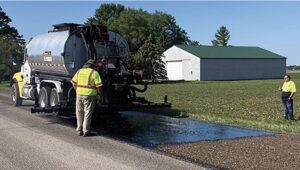Final Report Shows Favorable Results For Michigan’s Rubber-Modified Chip Seal Roads
County road commission adds rubber-modified chip seal to its “toolbox” as preventative maintenance for asphalt pavements.
Michigan’s Bay County Road Commission’s (BCRC), 2023 Hot Applied Rubber Modified Chip Seal Project, funded through the Michigan Department of Environment, Great Lakes and Energy (EGLE) , included 36.4 lane miles or 18.2 linear miles of rubber- modified chip seal over existing asphalt.
This is the third year the BCRC utilized rubber from the scrap tire waste stream as an additive to the asphalt emulsion used in the chip seal process.
“The decision to continue to use this product was based on the very favorable results from its use in 2021 and 2022. The ease of placement and resulting durability after two years of being subjected to freeze-thaw cycles and snow removal blades, led the BCRC to continue with the product,” the report said.
 The 2023 project included the application of rubber-modified chip seal to roadways ranging from low volume, rural roadways in poor to very good condition without identifiable base or subbase failures. The intent of using the rubber-modified chip seal was to: seal the existing cracks, extend the lifespan of the pavement, protect the integrity of the base and subbase materials by preventing water intrusion and monitoring the durability of the product over time. Determining its longevity when applied to poor to very poor roads, gives the BCRC an “extension of time” to budget for a more robust rehabilitation of these types of roadways. It’s a key component in the evaluation of this process and product and in line with the agency’s current engineering practices and philosophy of “Keeping the Good Roads Good”, the report said.
The 2023 project included the application of rubber-modified chip seal to roadways ranging from low volume, rural roadways in poor to very good condition without identifiable base or subbase failures. The intent of using the rubber-modified chip seal was to: seal the existing cracks, extend the lifespan of the pavement, protect the integrity of the base and subbase materials by preventing water intrusion and monitoring the durability of the product over time. Determining its longevity when applied to poor to very poor roads, gives the BCRC an “extension of time” to budget for a more robust rehabilitation of these types of roadways. It’s a key component in the evaluation of this process and product and in line with the agency’s current engineering practices and philosophy of “Keeping the Good Roads Good”, the report said.
The BCRC partnered with asphalt/rubber emulsion and coated stone supplier Entech, Inc. and Bunting Stone & Gravel Products to complete the project. BCRC’s intent for this year’s project was to use all BCRC crews/staff and have the BCRC supply the majority of the equipment.
“We achieved that goal and thus far, the BCRC is very impressed by its performance and a proponent for its use statewide,” the report said.
Longevity will continue to be monitored, both by the BCRC, EGLE and Michigan Tech University, to quantify and hopefully validate the use of rubber-modified chip seal as being a viable, cost-effective “tool in the toolbox” for use on Michigan roadways. “
The total cost for labor, materials and equipment for the 2023 Hot Applied Rubber Modified Chip Seal Project was $954,116. Total lane miles treated was 36.4 at a cost of $3.72/ per square yard (syd) — a $0.55/syd savings over the previous year. A significant decrease in cost to the BCRC which the report attributes to the use of BCRC staff and equipment for the project. By working over the winter of 2023- 2024 to obtain the heated emulsion and add the rubber locally, will further drop the $/syd price of applying rubber-modified chip seal, the report said.
The project used 28,400 scrap tires that were processed into liquid, rubber modified, asphalt emulsion by Entech, Inc located in Middlebury, Indiana. The “We are monitoring this product’s performance under Bay County’s freeze-thaw cycles, giving us, Entech, MTU and EGLE the opportunity to see how this particular product performs. Of particular interest, is how the rubber-modified product performs in comparison to a traditional chip seal over a roadway in fair condition
“We reviewed projects completed the past two years and they are performing very well considering they were placed on roadways in poor condition. Ride-quality is somewhat sacrificed to obtain a roadway sealed from water intrusion, extending its useful life conservatively, at least five years. There are solid indications the extension will be somewhere in the 5 to 10-year timeframe.
One unexpected benefit of the rubber-modified chip seal was public reaction. “There was none, which in this case, was a “good thing”, Bay County road c The BCRC placed a traditional chip seal on the same section of roadway approximately 15 years ago.“
“The phones, social media and email blew up. The public hated the loose chips, the dust and couldn’t understand why we would chip seal a perfectly good road. This did not happen with the rubber-modified product. Since the product is blacker than traditional chip seal and the chips are really “stuck” to the emulsion, there are minimal loose chips and dust as compared to traditional chip seal. This year we immediately followed the chip sealing process with a fog seal. This made the road look even more like asphalt. The BCRC didn’t receive any calls complaining about the process. And, the road ride quality is exceptional. This is a huge win for the BCRC and public.”
The BCRC has added rubber-modified chip seal in its “toolbox” as preventative maintenance for asphalt pavements.
The BCRC credits EGLE for allocating funding for the past three years to allow the BCRC to “ get to this point and add an important preventative maintenance product/process to our road maintenance arsenal.”
© Scrap Tire News, November 2023






